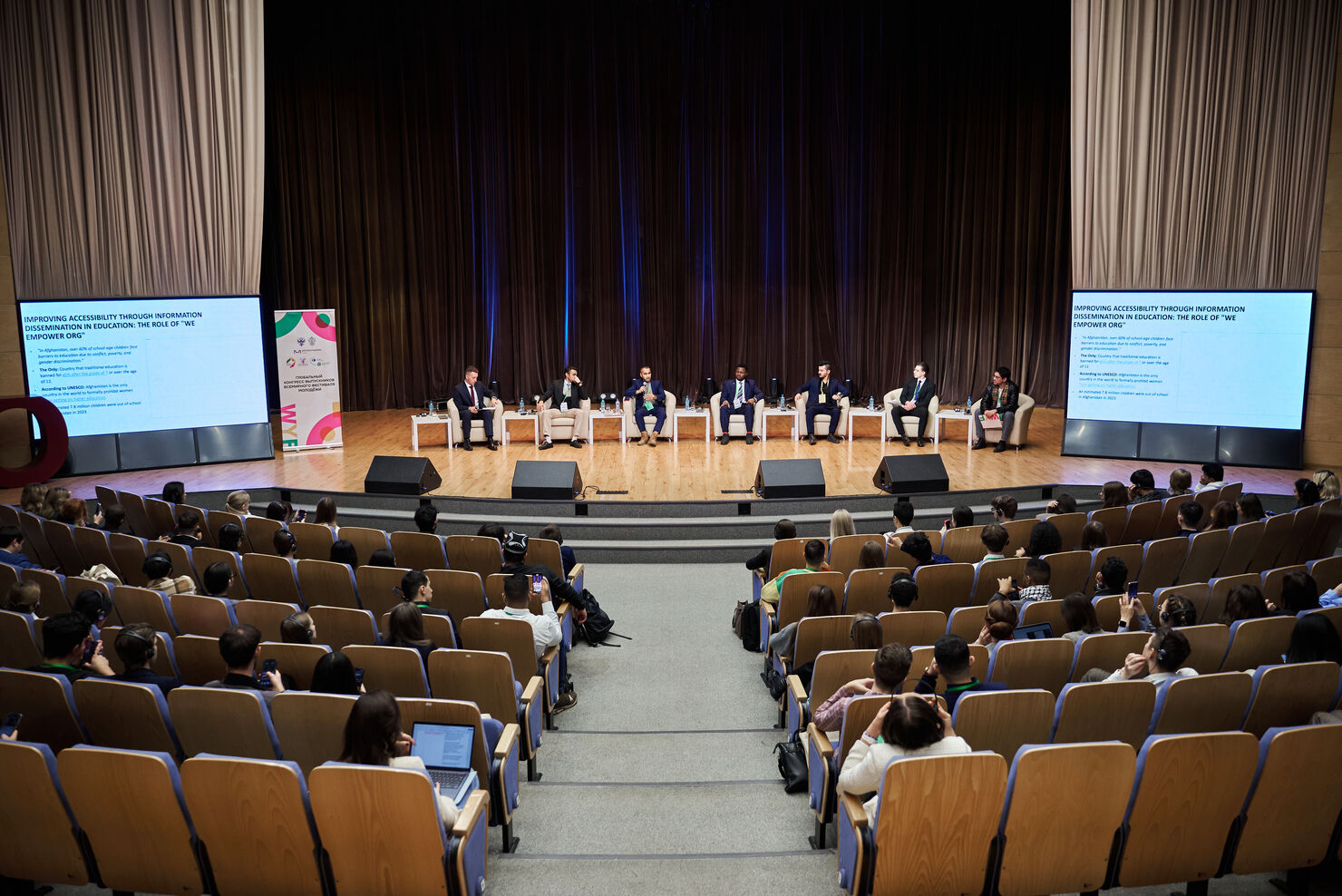
On November 27, the World Youth Festival Alumni Global Congress hosted panel discussions devoted to the challenges of modern education and journalism.
As part of the “Accessibility of Education in the 21st Century: International Outlook” session, foreign experts discussed global practices, approaches to education and challenges in the field. Hayat Sayedi from Afghanistan, founder of We Empower and client manager at Podcast Inc., talked about the problem of accessibility of education in his country and the need for developing the culture of education and self-education to get long-term changes going in society. Hevar Hassan from Iraq, journalist and international commentator, noted the need for adapting the approaches to delivering information with regard to every generation’s interests.
Head of the International Center of MSU Student Union Yossr Ghazy discussed opportunities of Russian education for foreign students.
“Russia has a reputation of a country with a high level of academic education. These universities are always ranked among the world’s best. Today, prestigious Russian universities are centers of innovation, especially in engineering, medicine, physics, mathematics and many other fields. Additionally, every year Russia provides foreign students with tens of thousands of scholarships that make it an accessible and attractive place to get a higher education in,” emphasized Yossr Ghazy.
Kingsley Osuji from the Republic of Congo, ambassador of the World Literacy Foundation, doctoral student at Lobachevsky University, noted the importance of literacy as a minimum skillset. At the same time, Samuel Matas, former member of the Academic Senate of Comenius University and representative of the Slovak Association at MGIMO, presented his assessment of the factors that negatively impact the accessibility of knowledge. According to him, in the modern world, politics and the mass media shape understanding of truth, history, and reality in general.
Alejandro Caballero from Paraguay, lawyer and WYF-2024 ambassador, talked about international cooperation as the best way to increase the accessibility of education:
“Education is not just a way towards personal growth. It’s what links different cultures, contributes to mutual understanding and gives opportunities throughout life. Educational exchanges and internships allow to broaden young people’s knowledge. Our countries don’t need abstract ideas, but rather real resources which give students and tutors opportunities to introduce innovations and develop in their field. And it’s not just about academic knowledge. Undoubtedly, education can’t be considered comprehensive without studying the culture of other countries”.
Participants of the WYF Alumni Global Congress also learned about the problems and prospects of the modern media industry. The “Challenges of Modern Journalism: Experience of Foreign Experts” session featured international experts who had taken part in the international track of the All-Russian Youth Educational Forum SHUM in October 2024.
One of the main problems of the media sphere is the propagation of misinformation. This was mentioned by Luz Rodriguez, Coordinator of the Cuatro F newspaper’s multiplatform and member of the youth communication group of the United Socialist Party of Venezuela. According to her, a global war against truth is being fought today, which means it’s necessary to protect journalism as a pillar of democracy and sovereignty.
“In today’s world, where information moves faster than our ability to analyze it, fake news has ceased to be simple distortions and has become a weapon of mass manipulation. We are not just talking about isolated errors, but rather deliberate strategies that seek to influence public perception, shape realities and justify interventionist policies,” said Luz Rogriguez.
Pablo Borda from Argentina, blogger and author of a history YouTube channel, used his country as an example to discuss the consequences for journalism that arise when countries attempt to follow the Western hegemony.
Collins Agwam from Nigeria, reporter for Punch newspaper, highlighted another threat to traditional media which is the growing popularity of social media.
“Modern journalism has undergone many changes. Technological advancements have made information more accessible and audiences have become more active in collecting and delivering news. The migration of readers, viewers and advertisers from newspapers and broadcasting companies to social media demonstrates that technology is the main driver of change in society, as the number of Internet users continues to grow day by day,” said Collins Agwam.
According to Alexander Stojanovic from Bosnia and Herzegovina, journalist at Provjereno.info, the mass media is becoming a powerful weapon in the hands of political organizations and the speed and intensity of the news flow prevail over the accuracy and quality of information.
“News is now published in real time which puts serious pressure on journalists and the mass media requiring them to spread information quickly. Such pursuit of promptness often impacts the quality of reporting as journalists are left with less time for fact-checking,” noted the foreign expert.
Jeziret Gonzalez Gallardo, Turkey’s IHA News correspondent and member of the Mexican Council on Foreign Relations, discussed the freedom of speech paradox in Mexico and the challenges that journalism faces in the country. Petar Popovic from Serbia, editor for Pepo media platform and political influencer, presented the main tools and technologies that allow to gain popularity among the modern audience.
Overview:
The World Youth Festival took place on March 1–7, 2024 in Sirius, according to the Decree of Russian President Vladimir Putin on the development of international youth cooperation. The WYF-2024 brought together 20,000 young leaders from 190 countries.
On the instructions of the President of the Russian Federation, the WYF will be held in Russia on a regular basis – once in six years. Also, every six years 10,000 young people from all over the world will get together at the International Youth Festival, and in between, international themed gatherings and events will be held under the auspices of the WYF. Festival events of various formats will be held in Russia annually.
According to the instructions of the President of the Russian Federation on the preservation and development of the Festival legacy, the World Youth Festival Directorate continues work aimed at strengthening international youth cooperation.